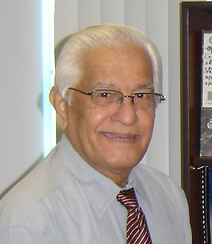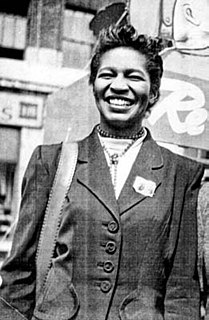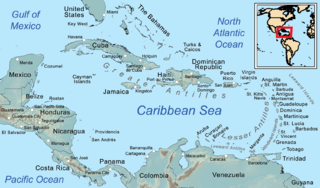Related Research Articles
The history of Trinidad and Tobago begins with the settlements of the islands by Indigenous First Peoples. Trinidad was visited by Christopher Columbus on his third voyage in 1498,, and claimed in the name of Spain. Trinidad was administered by Spain hands until 1797, but it was largely settled by French colonists. Tobago changed hands between the British, French, Dutch, and Courlanders, but eventually ended up in British hands following the second Treaty of Paris (1814). In 1889, the two islands were incorporated into a single political entity. Trinidad and Tobago obtained its independence from the British Empire in 1962 and became a republic in 1976.

Eric Eustace Williams was a Trinidad and Tobago politician who is regarded by some as the "Father of the Nation", having led the then British Colony of Trinidad and Tobago to majority rule on 28 October 1956, to independence on 31 August 1962, and republic status on 1 August 1976, leading an unbroken string of general elections victories with his political party, the People's National Movement, until his death in 1981. He was the first Prime Minister of Trinidad and Tobago and also a noted Caribbean historian, especially for his book entitled Capitalism and Slavery.
Calypso is a style of Caribbean music that originated in Trinidad and Tobago during the early to the mid-19th century and spread to the rest of the Caribbean Antilles and Venezuela by the mid-20th century. Its rhythms can be traced back to West African Kaiso and the arrival of French planters and their slaves from the French Antilles in the 18th century.

The People's National Movement (PNM) is the longest-serving and oldest active political party in Trinidad and Tobago. The party has dominated national and local politics for much of Trinidad and Tobago's history, contesting all elections since 1956 serving as the nation's governing party or on four occasions, the main opposition. As a result, it has sometimes been referred to as Trinidad and Tobago's "main political party". There have been four PNM Prime Ministers and multiple ministries. The party espouses the principles of liberalism and generally sits at the centre to centre-left of the political spectrum.
The National Union of Freedom Fighters (NUFF) was an armed Marxist revolutionary group in Trinidad and Tobago. Active in the aftermath of the 1970 Black Power Revolution, the group fought a guerrilla warfare campaign to overthrow the government of Prime Minister Eric Williams following the failed Black Power uprising and an unsuccessful mutiny in the Trinidad and Tobago Regiment.

Winston Chandarbhan Dookeran is a Trinidadian and Tobagonian politician and economist as well as international public official. Dookeran is the current Secretary-General of EUCLID, an intergovernmental institution of higher learning. He previously served as Political Leader of the Congress of the People, central bank governor, minister of finance, and minister of foreign affairs.
Edwin Ayoung, better known as Crazy, is a Trinidadian calypsonian. He has been active since the mid-1970s and is one of the most successful artists from Trinidad and Tobago.

Basdeo Panday is a Trinidadian and Tobagonian lawyer, politician, trade unionist, economist, actor, and former civil servant who served as the fifth Prime Minister of Trinidad and Tobago from 1995 to 2001. He was the first person of Indian descent along with being the first Hindu to hold the office of Prime Minister of Trinidad and Tobago. He was first elected to Parliament in 1976 as the Member for Couva North, Panday served as Leader of the Opposition five times between 1976 and 2010 and was a founding member of the United Labour Front (ULF), the National Alliance for Reconstruction (NAR), and the United National Congress (UNC). He served as leader of the ULF and UNC, and was President General of the All Trinidad Sugar and General Workers' Trade Union.

Trinidad and Tobago, officially the Republic of Trinidad and Tobago, is the southernmost island country in the Caribbean. Consisting of the main islands Trinidad and Tobago, and numerous much smaller islands, it is situated 130 kilometres south of Grenada and 11 kilometres off the coast of northeastern Venezuela. It shares maritime boundaries with Barbados to the northeast, Grenada to the northwest and Venezuela to the south and west. Trinidad and Tobago is generally considered to be part of the West Indies. The island country's capital is Port of Spain, while its largest and most populous city is San Fernando.

Claudia Vera Jones was a Trinidad and Tobago-born journalist and activist. As a child, she migrated with her family to the US, where she became a Communist political activist, feminist and black nationalist, adopting the name Jones as "self-protective disinformation". Due to the political persecution of Communists in the US, she was deported in 1955 and subsequently lived in the United Kingdom. Upon arriving in the UK, she immediately joined the Communist Party of Great Britain and would remain a member for the rest of her life. She then founded Britain's first major black newspaper, the West Indian Gazette, in 1958, and played a central role in founding the Notting Hill Carnival, the second-largest annual carnival in the world.
Prostitution in Trinidad and Tobago is legal but related activities such as brothel keeping, soliciting and pimping are illegal.

The Caribbean is a region of the Americas that consists of the Caribbean Sea, its islands and the surrounding coasts. The region is southeast of the Gulf of Mexico and the North American mainland, east of Central America, and north of South America.
The Chief Justice of Trinidad and Tobago is the highest judge of the Republic of Trinidad and Tobago and presides over its Supreme Court of Judicature. He is appointed by a common decision of the president, the prime minister and the leader of the main opposition party.

Marion Patrick Jones was a Trinidadian novelist, whose training was in the fields of library science and social anthropology. She is also known by the names Marion Glean and Marion O'Callaghan. Living in Britain during the 1960s, she was also an activist within the black community. She was the author of two notable novels – Pan Beat, first published in 1973, and J'Ouvert Morning (1976) – and also wrote non-fiction.

Olive Walke, MBE was a Trinidadian musician and ethnomusicologist who was one of the first to collect regional Caribbean folk songs. She founded the well-known choir, La Petite Musicale and directed it for many years. Between 1961 and 1966, she served as a Senator in the first Parliament of Trinidad and Tobago established after its independence.

Christina F. Lewis was an Afro-Trinidadian community worker, trade unionist and women's rights activist. Through her political activities, she worked to improve the conditions of workers and women, advocating for universal adult suffrage and for British citizens of the West Indies to have the same rights and privileges as their counterparts in Britain. As a socialist, Pan-Africanist, and feminist, she merged anti-colonial policies with the struggle for women's rights and against racism.

The Tobago Council of the People's National Movement (PNM), also known as the Tobago Council of the PNM, PNM Tobago or PNM Tobago Council is the longest-serving and oldest active political party in Tobago. The party is the autonomous branch of the Trinidad and Tobago People's National Movement operating in Tobago. While its political leader acts in the local capacity, they also serve as a deputy leader on a national level. The party's executives organize for both local and national election campaigns. There have been three PNM Chief Secretaries and administrations.

Trinidadian and Tobagonian nationality law is regulated by the Trinidad and Tobago Constitution Order of 1962, as amended; the 1976 Citizenship Act, and its revisions; and various British Nationality laws. These laws determine who is, or is eligible to be, a national of Trinidad and Tobago. Trinidadian and Tobagonian nationality is typically obtained either on the principle of jus soli, i.e. by birth in Trinidad and Tobago or under the rules of jus sanguinis, i.e. by birth abroad to parents with Trinidadian and Tobagonian nationality. It can be granted to persons with an affiliation to the country, or to a permanent resident who has lived in the country for a given period of time through naturalisation. There is not currently a program in Trinidad and Tobago for persons to acquire nationality through investment in the country. Nationality establishes one's international identity as a member of a sovereign nation. Though it is not synonymous with citizenship, for rights granted under domestic law for domestic purposes, the United Kingdom, and thus the commonwealth, have traditionally used the words interchangeably.
Selwyn Ryan was a Trinidad and Tobago political scientist and pollster. Ryan has been described as "the author of record for the nation's modern political history" and "the most prolific and influential intellectual in post-colonial Trinidad". He was Professor Emeritus at the University of the West Indies (UWI) St Augustine Campus.
References
- ↑ Birth, Kevin K. (January 2008). Bacchanalian sentiments: musical experiences and political counterpoints in Trinidad. Duke University Press. pp. 159–. ISBN 978-0-8223-4165-9 . Retrieved 11 March 2011.
- ↑ Meighoo, Kirk Peter (December 2003). Politics in a "half made society": Trinidad and Tobago, 1925-2002. Markus Wiener Publishers, 2003. p. 198. ISBN 978-1-55876-306-7 . Retrieved 11 March 2011.
- ↑ Gest, Justin (2022). Majority Minority. Oxford University Press. p. 143. ISBN 9780197641798.
- ↑ Gilmore, John (2001). "Trinidad and Tobago". In Jones, Derek (ed.). Censorship: A World Encyclopedia. Taylor & Francis. p. 2456. ISBN 9781136798641.